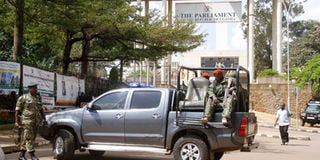Prime
Is Museveni’s proposal on snipers for MPs workable?

Army officers at Parliament recently. FILE PHOTO
What you need to know:
- MPs started expressing security fears towards the end of last year when Parliament kicked off proceedings on the contentious Constitution Amendment Act that was passed to remove the presidential age limits.
- With MPs who supported the removal of age limits fearing for their lives, the government provided them with guards from the Counter-Terrorism Police.
With MPs scared out of their wits following a spate of high-profile assassinations, President Museveni has ordered that each legislator be guarded by UPDF snipers and provided with escort cars to protect them from terrorists.
Mr Museveni’s proposal has, however, triggered an avalanche of questions with MPs and Ugandans puzzled over how such an unprecedented security arrangement will be pulled off in the wake of high-profile assassinations.
When Mr Museveni’s letter detailing how he wants MPs secured was made public early this week, the first question that came to the fore was how funding for the escort cars and guards would be secured with the money not included in the 2018/19 Budget that is barely a month old.
Estimates
Estimates calculated by this newspaper indicated that the cost of the new vehicles could range from anywhere between Shs270b to Shs866b depending on the model, type and year of manufacture of the armoured vehicles that the government wants to buy for the MPs.
This cost does not factor in allowances/salaries for drivers, and fuelling and maintenance expenses, money that will further skyrocket taxpayer’s expenditure on MPs’ security.
Sources familiar with the planning going on say the Finance ministry is considering raising this money through a supplementary request but is wary that such a request may not fly in the face of the Public Finance Management Act.
Civil society groups have already warned that a supplementary request to fund this expenditure would offend Section 25(6) of the Public Finance Management Act that stipulates that a supplementary budget may be approved only when the expenditure is unabsorbable, unavoidable and unforeseeable.
Neither unavoidable nor unforeseeable
Mr Julius Mukunda, the executive director of the Civil Society Budget Advocacy Group says the situation of MPs’ security is neither unavoidable nor unforeseeable and therefore can’t be funded by supplementary request.
“Everyone, including the President, was seeing that security was deteriorating and so such spending cannot be unforeseeable. That expenditure is also not unavoidable,” says Mr Mukunda.
The Secretary to the Treasury, Mr Keith Muhakanizi, has promised that technocrats at the Finance ministry will advise the President on how best his grand proposal can be implemented while the Speaker of Parliament Rebecca Kadaga will also convene a meeting of the Parliamentary Commission to discuss the same.
Mr Muhakanizi declined to definitively state whether the money will be raised by way of a supplementary request.
“We shall advise the President and the best way whether we have found the money or not, I think all I can say is that we shall advise the President or implement his decision to the best way we can with a discussion with him,” Mr Muhakanizi said at a press briefing this week.

Alternative
The other alternative that Treasury could explore would have been to allow the Clerk to Parliament, who is the accounting officer of the Legislature, to do a virement (transfer of budgeted funds from an unspent appropriation category to another) to cater for the money required for MPs’ escort vehicles.
But that too would run into legal headwinds as Section 22(a) demands that a virement cannot be more than 10 per cent of the money allocated for an item or an activity while clause B stipulates that the virement cannot be contentious.
Finance minister Matia Kasaija is out of the country and arrangements to mobilise funding for MPs’ security will kick up in earnest when he returns tomorrow.
Another question that has been lingering regarding Mr Museveni’s proposal is that he may have opened Pandora’s Box and set a dangerous precedent by ordering for escorts for threatened MPs.
Will the President provide escort cars and army snipers for any Ugandan who feels threatened?
Asked whether Mr Museveni’s directives may have set a dangerous precedent, Gen Elly Tumwine, the Security minister, insisted the President was addressing a particular threat to MPs and similar threats can be handled on a case-by-case basis.
“Things are done according to need and the means available. You do everything you can but you cannot stop death. The President was very clear that because there is a threat to MPs, this will be a temporary measure and not permanent. Once the measures are put in place, the guards will be returned,” Gen Tumwine says.
There are also concerns over whether Parliament has the capacity to accommodate an additional 400 vehicles.
The multi-level parking lot at Parliament accommodates more than 500 vehicles and if all the 456 MPs were to be provided with escort cars, there would be need for parking lots to accommodate more vehicles.
The parking lot is also used by Parliament staff and is already under stress because of the construction of the new chamber that is being set up where parking space was previously used by Parliament staff.
Motorists have also been concerned about the potential mess that 456 escort cars may cause on our roads, with the road network in the city already burdened by heavy traffic.
Right of way
Dr Stephen Kasiima, the police director in charge traffic and road safety, could not be reached to explain how traffic police will regulate MPs’ escort cars.
But police spokesperson Emilian Kayima said for MPs to be entitled to a right of way, the Traffic and Road Safety Act would have to be amended.
“Having a lead car does not necessarily mean that they have a right of way unless the law is amended to that effect,” Mr Kayima says.
Such is the contentious nature of Mr Museveni’s proposed escort cars that some MPs have already declared that they will not take them up amid concerns that guards could be used to gather intelligence on regime opponents.
MPs started expressing security fears towards the end of last year when Parliament kicked off proceedings on the contentious Constitution Amendment Act that was passed to remove age limits to pave way for Mr Museveni running for the presidency as many times as he so wishes.
The Bill kicked up a firestorm in the country as exasperated voters threatened to harm MPs who had voted to support the removal of age limits even after consulting their constituents who demanded that Article 102(b) be maintained.
With MPs who supported the removal of age limits fearing for their lives, the government provided them with guards from the Counter-Terrorism Police.
But following the June 8 assassination of Arua Municipality MP Ibrahim Abiriga, who was a vociferous supporter of the removal of age limits, MPs demanded a meeting with the President where they lamented about threats to their lives and Mr Museveni responded by ordering for UPDF snipers for terrified legislators.




